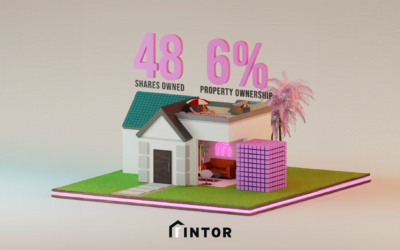Net operating income (NOI) is the remaining profit after subtracting your operating expenses from the revenue. NOI is a real estate metric used when evaluating a property’s performance.
What is Net Operating Income?
Net operating income (NOI) is the amount of profit remaining after subtracting operating expenses from operating revenue. In real estate, net operating income is used to evaluate the income generating potential of a property. This number is closely tied to a property’s cap rate.
The NOI formula is simply operating revenue minus operating expenses. For real estate, operating revenue means rental income while operating expenses include items such as insurance, property taxes, HOA payments, and property management fees.
Net operating income is usually expressed monthly or yearly. It’s important to keep the timelines consistent. Moreover, there is a difference when looking at historical NOI performance (e.g., when you have past data) and making forward projections.
Let’s walk through an example with a single family residence located at 123 Peach Street that rents for $1800 per month and has monthly expenses of $1400.
Net Operating Income = Operating Revenue – Operating Expense
Net Operating Income = $1800 – $1400
Net Operating Income = $400/month
In order to turn this monthly number into an annual number, we need to multiply by 12. As such, the property above generates $4,800 per year of profit.
Keep in mind that some expenses do not show up monthly (e.g., property taxes or repairs) and need to be accounted for.
Net Operating Income Formula
The net operating income formula is:
Net Operating Income = Operating Revenue – Operating Expense
In accounting, operating revenue refers to the revenue generated through the normal course of business. For real estate investors, operating revenue comes from collecting rent payments.
Non-operating revenue would be income generated through other sources, such as gains on foreign exchange transactions.
Operating expenses refer to expenses generated through the normal course of business as well. For real estate, these include insurance, property taxes, HOA payments, and property management fees.
Non-operating expenses would be one-time or miscellaneous expenses that do not reflect the core business, such as losses on foreign exchange transactions, or lawsuits.
If you know either of the two variables in the formula, you can solve for the third.
You could rewrite the formula as:
Net Operating Income = Operating Revenue – Operating Expenses
Operating Revenue = Net Operating Income + Operating Expense
Operating Expense = Operating Revenue – Net Operating Income
Real Estate Operating Revenue and Expenses
Net operating income is a financial metric used by investors, lenders, analysts, and others to evaluate a property. When evaluating NOI, it’s important to make sure that you include the right numbers or else your results will vary significantly from reality.
For example, should you include the loan payments or depreciation in your NOI calculation?
Here are some good principles to keep in mind:
- Net operating income looks at the ordinary revenue and ordinary expenses. Your goal is to analyze the property’s underlying performance and create an apples-to-apples scenario between properties.
- Loan payments are generally included in net operating income since it’s a direct cost that needs to be paid for the property to continue to perform.
- Depreciation is not included in net operating income as it’s a non-cash expense and doesn’t affect the cash flow of the property.
Net Operating Income Example
Let’s walk through an example where we are not given operating expenses, but we are given a list of expenses to select from.
456 Summer Way – Annual
- Rent Revenue: $12,000
- Property Taxes: $2,400
- Home Insurance: $2,000
- HOA Payment: $1,800
- Depreciation Expense: $4,000
First, let’s calculate operating expenses. As mentioned above, we should not include depreciation since that is a non-cash expense that is accounted for below NOI.
In this case, operating expenses is the sum of property taxes, home insurance, and HOA payments.
NOI = Operating Revenue – Operating Expenses
NOI = $12,000 – ($2,400 + $2,000 + $1,800)
NOI = $12,000 – $6,200
NOI = $5,800
Can NOI be Negative?
Short answer, yes. Net operating income can be positive, negative, or zero.
When operating revenue ($600) equals operating expenses ($600) for the period, the net operating income is zero and the property is at breakeven.
If the operating revenue ($1,000) is greater than operating expenses ($800), the NOI is positive and the property is generating a profit ($200).On the other hand, if operating revenue ($2,000) is less than operating expenses ($2,500), the NOI is negative and the property is generating a loss (-$500).
Ways to Improve NOI
At the end of the day, you can improve net operating income by either increasing revenue or decreasing expenses.
Here are a few ways to increase the net operating income of a rental property:
-
- Increase rent. Evaluate your rent rate once a year to make sure you are keeping up with market rates. If you are unpriced by $100/month, you are leaving over $1,000 a year on the table.
- Improve curb appeal. Small investments into better landscaping, paint, photos, and more can increase the interest in your properties to support a higher rent.
- Renegotiate insurance. Again, once a year you should check to make sure that your insurance rates are still competitive. Insurance companies are constantly adjusting strategies and premiums, so it’s unlikely that the same company will offer the best rates over an extended period of time.
- Switch monthly payments to annual. Where possible, you should look to get discounts for making annual prepayments. For example, you could save hundreds of dollars by simply changing your current insurance policy to be paid yearly instead of monthly.
- Add additional services or amenities. Another way to increase revenue is to ask tenants which services they would pay for. Offering cleaning, laundry, landscaping, covered parking, or other services could be a good way to generate additional cash.
Summary
Net operating income refers to the profit remaining after subtracting operating expenses from operating revenue. This is a common financial metric in real estate investing. All things being equal, it’s better to have higher net operating income.
NOI provides a safety net in case of vacancy or if a property needs repairs, plus it increases the return that an investor receives. When looking at NOI for multiple properties, it’s important to make sure you include the same expense categories across the board. You don’t want to include property taxes for Property A and not for Property B in your analysis.
It would be unfair to include property insurance when evaluating one property but not include property insurance in the other scenario.
The same is true for expenses that do not recur monthly. If an expense is incurred quarterly or annually, you should divide that cost up over time to provide a more realistic cash flow estimate.
Typical operating revenue is rental income and typical operating expenses are insurance, property taxes, homeowners association payments, and property management fees.
NOI is closely linked to the capitalization rate. All things being equal, if a property’s net operating income increases, the cap rate will also increase.



